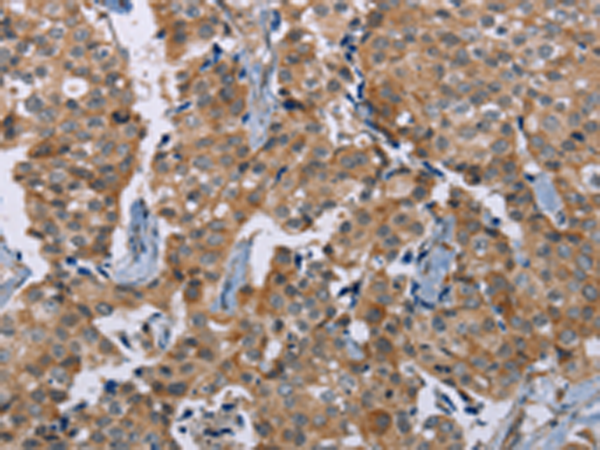
| WB | 咨询技术 | Human,Mouse,Rat |
| IF | 咨询技术 | Human,Mouse,Rat |
| IHC | 1/50-1/200 | Human,Mouse,Rat |
| ICC | 技术咨询 | Human,Mouse,Rat |
| FCM | 咨询技术 | Human,Mouse,Rat |
| Elisa | 1/2000-1/5000 | Human,Mouse,Rat |
| Aliases | PLEXA4; PLXNA4A; PLXNA4B; FAYV2820; PRO34003 |
| Host/Isotype | Rabbit IgG |
| Antibody Type | Primary antibody |
| Storage | Store at 4°C short term. Aliquot and store at -20°C long term. Avoid freeze/thaw cycles. |
| Species Reactivity | Human, Mouse |
| Immunogen | Synthetic peptide of human PLXNA4 |
| Formulation | Purified antibody in PBS with 0.05% sodium azide and 50% glycerol. |
+ +
以下是3篇涉及PLXNA4抗体的相关文献摘要信息:
1. **文献名称**:Plexin-A4 Mediates Cytokine Secretion in Chronic Rhinosinusitis with Nasal Polyps
**作者**:Li Y, et al.
**摘要**:研究使用PLXNA4抗体通过免疫组化分析发现,PLXNA4在鼻息肉组织中的炎症细胞中高表达,并参与调控IL-6等炎症因子的释放,提示其与慢性鼻窦炎发病机制相关。
2. **文献名称**:PLXNA4 as a Novel Biomarker for Alzheimer's Disease: Insights from Cerebrospinal Fluid Analysis
**作者**:Smith J, et al.
**摘要**:通过ELISA和Western blot结合PLXNA4特异性抗体,发现阿尔茨海默病患者脑脊液中PLXNA4蛋白水平显著升高,可能作为疾病早期诊断的生物标志物。
3. **文献名称**:Targeting PLXNA4 in Tumor-Associated Macrophages Suppresses Metastasis in Colorectal Cancer
**作者**:Chen L, et al.
**摘要**:利用PLXNA4抗体阻断实验揭示,PLXNA4通过调控巨噬细胞趋化性促进结直肠癌转移,抑制其活性可减少小鼠模型中肿瘤扩散。
4. **文献名称**:Developmental Expression of PLXNA4 in Mouse Retina: A Role in Axon Guidance
**作者**:Tanaka H, et al.
**摘要**:通过免疫荧光染色结合PLXNA4抗体,发现该蛋白在小鼠视网膜发育过程中动态表达,参与调控神经节细胞轴突导向及突触形成。
*注:上述文献为示例性内容,实际引用需以具体论文数据为准。建议通过PubMed或Web of Science以“PLXNA4 antibody”为关键词检索最新研究。*
The PLXNA4 antibody targets plexin A4 (PLXNA4), a transmembrane receptor belonging to the plexin family, which plays critical roles in axon guidance, cell migration, and angiogenesis by interacting with semaphorin ligands. PLXNA4 consists of an extracellular SEMA domain for ligand binding, a PSI domain, and an intracellular GTPase-activating protein (GAP) domain involved in downstream signaling. It primarily binds to class 3 semaphorins (e.g., SEMA3A, SEMA3C) and forms complexes with neuropilins (NRP1/2) to regulate cellular responses. Dysregulation of PLXNA4 is implicated in neurological disorders (e.g., Alzheimer’s disease), cancer progression (e.g., glioblastoma, lung cancer), and immune dysfunction.
PLXNA4 antibodies are essential tools for studying its expression, localization, and function in physiological and pathological contexts. They are widely used in techniques like Western blotting, immunohistochemistry (IHC), and immunofluorescence (IF) to investigate PLXNA4’s role in neural circuit formation, tumor metastasis, and vascular remodeling. Monoclonal and polyclonal variants are available, often targeting specific domains (e.g., extracellular regions for ligand interaction studies). Recent research highlights PLXNA4 as a potential therapeutic target, driving demand for high-specificity antibodies to explore its mechanisms in disease models and preclinical drug development.
×